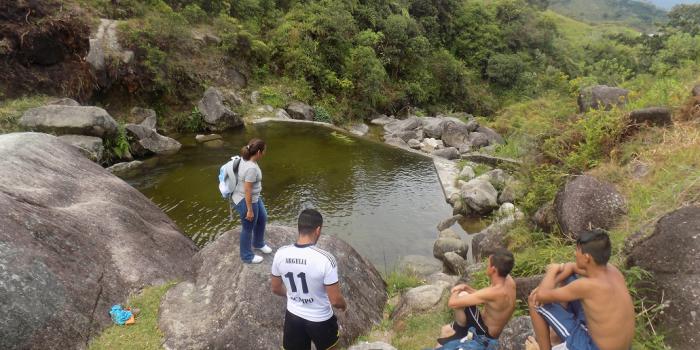
Algeria recovers traditions and moves forward with its collective reparation
Its inhabitants regain their main natural attraction from which they left because of armed conflict. In addition, they approved a communication strategy to resignify it as a meeting and tourism site.

After many years of not being able to visit its crystalline waters and natural landscape due to the armed conflict, the inhabitants of Algeria (Antioquia) have returned to Charco del Tanque to recover it as a social meeting place and project it as a tourist attraction.
As part of the measures for the restitution of the comprehensive collective reparation plan that is being implemented in this Antioquia municipality, coordinated by the Victims Unit, a concerted communication strategy was designed with social leaders and victims to ensure that the Algerians and the visitors take ownership of the place.
The community representatives and the City Hall approved with satisfaction the action developed by the Communications Advisory Office, considering that "it complied with the requirements and criteria agreed with the community".
According to María Clara Espinosa, leader of the collective reparation team of the Victims Unit in Antioquia, "the communication strategy was received to the satisfaction of the community and the success is that it was built with their participation to recover a traditional practice that allows move forward with the collective reparation plan".
Now that the armed conflict ceased in eastern Antioquia, without FARC, or paramilitary groups. The Algerians want El Charco de El Tanque to be a reference again for the economic, social and even for their traditions that are beginning to be felt in the municipality.
The collective repair progresses
Andrés Felipe Zapata, president of the Community Action Board of El Tanque neighborhood, recalls that "this place is very important because almost everyone learned to swim there and it was the place for community meetings and family walks because it is a natural site".
And he explains that "at the time of conflict the people were afraid to come because there were armed groups, but now Victims' Unit is helping us to recover it and make it tourist so that they come to Algeria and take a new image that no longer it's violence".
The communications strategy to promote this natural site includes the production of radio spots and a promotional video with participation of the area inhabitants, graphic design of the image (logo) of the site for promotional pieces, memes and training for social networks, in addition of the regulation and the historical review in memory of victims.
This traditional place of family walks became a sector that instilled terror because both the FARC and paramilitary groups took over this sector where they committed multiple crimes against the civilian population, such as homicides, kidnappings and forced disappearances.
The measures already implemented of the collective reparation that have contributed to the recovery of this municipality and its victims are the creation of a micro-enterprise that benefits 60 garment women, permanent presence of public force, endowment of the House of Culture and reactivation of the parties of the mule and the peasant.
In this eastern Antioquia municipality, the Victims Unit has invested 25,925 million pesos in humanitarian assistance and individual reparation, with 2,168 compensations given to the survivors of conflict.
Communications strategies
Since 2017, the Communications Advisory Office has contributed measures with a communication component to move forward with collective reparation plans for several communities. In Zipacoa (Bolívar) a strategy was designed for the resignification of the town's patron saint festivities and as a territory of peace, while in Genova (Quindío) a radio program, videos and a memory gallery on resilience were produced of its victims.
With the communities of Turbay and El Mohán (Santander) audio-visuals, videos and booklets of stories about local stories and a CD with peasant music (Ritmos de la Montaña) were made, which will be delivered this week to these subjects of collective reparation.
(FIN/JCM/DMF)






